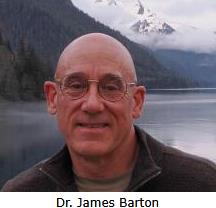 Dr. James Barton has gained extensive experience in the poultry industry in the Southeast and California regions of the industry. He is currently applying Ancera technology to solving practical problems throughout the poultry industry. Recently EGG-NEWS had the opportunity to review his activities in the areas of reducing the impact of coccidiosis and Salmonella infection.
Dr. James Barton has gained extensive experience in the poultry industry in the Southeast and California regions of the industry. He is currently applying Ancera technology to solving practical problems throughout the poultry industry. Recently EGG-NEWS had the opportunity to review his activities in the areas of reducing the impact of coccidiosis and Salmonella infection.
CHICK-NEWS: James, please share your background and experience with our Subscribers.

Dr. James Barton: My earliest memories of poultry production involved visits to the Animal Science Building at the University of Arkansas with my father Dr. Lionel Barton, who was the Extension Poultry Specialist for the state. At an early stage I realized that poultry was a growing industry and wanted to contribute to progress in feeding people.
CHICK-NEWS: Your formal training?
Dr. James Barton: After three years of a pre-veterinary BS in Agriculture at the University of Arkansas I entered the LSU School of Veterinary Medicine, graduating in 1990. I applied for and completed a residency in poultry veterinary medicine through the University of California Diagnostic Laboratory System. This enabled me to gain experience in broilers, egg production and turkeys. Satisfying requirements, I earned Diplomate status in the American College of Poultry Veterinarians in 1992. Subsequent practical experience allowed me to become a Charter Diplomate of the American College of Animal Welfare.
CHICK-NEWS: Please describe your industry experience.
Dr. James Barton: My first professional appointment was with Indian River in Texas as the veterinarian responsible for flock health and technical service both in the U.S. and for international customers. I accepted a position with Zacky Farms in California working with broilers and turkeys as the company veterinarian. I was subsequently offered and accepted a position with Cargill Turkeys in Arkansas that involved nine years of managing flock health, establishing a Salmonella control program, and initiating an animal welfare program. From 2006 to 2009 I was responsible for flock welfare at Tyson Foods, requiring the implementation of procedures to demonstrate compliance with the emerging animal welfare expectations of customers and society. At the request of the Arkansas Poultry Federation, I modernized the NPIP-approved laboratory while maintaining a consulting practice in the broiler, turkey, and layer industry.
CHICK-NEWS: When did you join Ancera?
Dr. James Barton: I was excited to become a member of the Ancera team in 2020 because of their advanced technology that offered food producers the opportunity to focus pathogen monitoring on financial objectives. Ancera’s platforms provide insights that enable better decision making to maximize profits by lowering cost and increasing production. Through the unique coccidia-monitoring program, it is possible to quantify the amount of coccidia exposure so that live production managers and vets can move off a failing program quicker and stay on an effective program longer. Optimizing coccidia control has become even more necessary with the adoption of drug-free and NAE broiler production.
CHICK-NEWS: How is the program implemented?
Dr. James Barton: Individual fecal samples are analyzed at our laboratories with a novel diagnostic device called PIPER, which specializes in high-quality, high-throughput microbial enumeration techniques. The basic oocyst per gram data are converted into a graphical image representing the status of the house, farm, and complex over time. More importantly, Bayesian modeling expresses the current coccidia control status relative to optimal performance expected from the specific control program.
CHICK-NEWS: Ancera is now applying technology to monitor Salmonella. Please elaborate.
Dr. James Barton: Ancera has acquired the global commercial rights for technology developed by Dr. Nikki Shariat at the University of Georgia which involves identification of the CRISPR gene sequences that are unique to Salmonella serotypes. By commercializing this technology and building a user-friendly software platform, our first integrator customers are monitoring the prevalence of their KPI serotypes and getting new visibility into transmission risk patterns. Ancera believes that the future of pre-harvest control of Salmonella infection will depend on recognizing that each Salmonella serotype has a specific behavior – rather than trying to treat Salmonella as a generic organism. Because traditional Salmonella culture techniques select for the serotypes that are best adapted to artificial media, the presence of multiple serotypes within a flock is overlooked very, very often. The serotypes that are missing detection in the live flocks can be the ones that are problematic in post-chill carcasses, parts, and ground poultry meat. Ancera believes that it is necessary to have a close relationship between poultry health and quality control teams within a production company to achieve effective control of potential foodborne pathogens.
CHICK-NEWS: What does Ancera offer for the future?
Dr. James Barton: We are very close to launching an assay for Total Viable Bacteria (TVB) that will be independent of culture technology. We are also well down the path of developing a quantitative assay for Clostridium perfringens based on fecal counts that will be valuable in managing programs to inhibit necrotic enteritis and potentially related infections. Finally, we regularly hear from customers about the need to objectively understand whether their vendors’ products used in control programs and interventions are working as intended. We’re excited to share some new developments in this area shortly.
CHICK-NEWS: Do you have any observations based on your extensive experience?
Dr. James Barton: The post-DVM training programs should reevaluate the advanced education of poultry veterinarians given the need to base technical decisions on the financial performance in an industry that continues to undergo consolidation. It is imperative that technical experts become even more involved in quantifying the return on investment from products and management practices – driving the management decisions with effective messaging, based on high quality evidence.